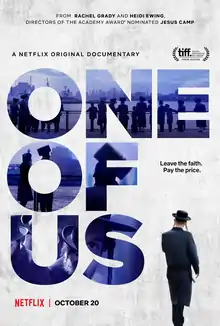One of Us (2017 film)
One of Us is a 2017 documentary feature film that chronicles the lives of three ex-Hasidic Jews from Brooklyn. The film was directed by Heidi Ewing and Rachel Grady, who also created the documentary Jesus Camp.[2] One of Us opened at the Toronto International Film Festival in September 2017, [3] and was distributed the following month of October via Netflix, which also financed the film.[4][5]
| One of Us | |
|---|---|
 Film poster | |
| Directed by | Heidi Ewing Rachel Grady[1] |
| Produced by | Heidi Ewing Rachel Grady |
| Music by | T. Griffin |
| Cinematography | Jenni Morello Alex Takats |
| Edited by | J. D. Marlow Enat Sidi |
Production company | Loki Films |
| Distributed by | Netflix |
Release date |
|
Running time | 95 minutes |
| Country | United States |
| Language | English Yiddish |
Synopsis
The film follows the lives of three ex-members of Brooklyn's Hasidic community: Ari Hershkowitz, Luzer Twersky, and Etty Ausch. Each struggles with being ostracized from their former community and families, while revealing how they came to leave.[6] The film also reveals their experience with religious doubt, as well as with both domestic abuse and childhood sexual abuse. Some receive support from ex-Haredi organizations such as Footsteps, while others work to find a footing in the secular world. The film also follows counselor Chani Getter in her work with helping former ultra-Orthodox individuals settle into the outside world.[7]
Reception
One of Us received overall positive reception from critics, garnering a 79% score from Metacritic,[8] and a 95% rating from Rotten Tomatoes.[9][10]
In one review, LA Weekly said of the film: "Although the focus remains squarely on its three subjects, One of Us effectively contextualizes this strange, backward community thriving in the middle of one of the most multicultural cities in the world."[11]
In Vulture.com, David Edelstein described "the relentless psychological abuse that this community inflicts when a member attempts to leave, especially with children in tow", and said that the film-makers "had no interest in making an 'objective documentary', although I doubt the Hasidim would have made themselves available to two women with a camera and their own hair. In such cases, they usually say, 'If you want to understand us, read the Torah.'"[12]
Awards
One of Us won "Most Compelling Living Subject of a Documentary" at the Critics' Choice Documentary Awards, as well as being nominated for "Best Documentary". The film was also nominated for "Best Documentary Feature" at the Philadelphia Film Festival in 2017.[13]
See also
- Menashe (2017 film)
- Unorthodox (miniseries), Docudrama based on the memoir of Deborah Feldman, who left her Hasidic community
- Leaving the Fold
- Let There Be Light (2007 film)
References
- Jason Guerrasio (21 November 2017). "How a Netflix documentary got inside New York City's intensely insular Hasidic community". Business Insider. Retrieved 9 May 2018.
- "In the moving Netflix documentary One of Us, 3 ex-Hasidic Jews struggle with secular life". Vox. Retrieved 2017-10-21.
- "One of Us". www.tiff.net. Archived from the original on 2017-10-21. Retrieved 2017-10-21.
- "Leaving everything behind". The Jerusalem Post. Retrieved 2017-10-21.
- Patrick Shanley (9 November 2017). "How 'One of Us' Filmmakers Gained Access to the Insular Hasidic Jewish Community". The Hollywood Reporter. Retrieved 9 May 2018.
- Alissa Wilkinson (19 October 2017). "In the moving Netflix documentary One of Us, 3 ex-Hasidic Jews struggle with secular life". Vox.com. Retrieved 9 May 2018.
- Ben Kenigsberg (October 19, 2017). "Review: 'One of Us,' a Portrait of Starting a New Life". The New York Times.
- One of Us, Metacritic, retrieved 2017-10-21
- One of Us, Rotten Tomatoes, retrieved 2017-10-21
- Nick Schager (10 September 2017). "Film Review: 'One of Us'". Variety. Retrieved 9 May 2018.
- Lara Zarum (16 October 2017). "Netflix's One of Us Reveals the Fight of Hasidic Jews to Break From the Sect". LA Weekly. Retrieved 9 May 2018.
- David Edelstein (7 November 2017). "One of Us is a Fascinating Look at the Challenges of Leaving Ultra-Orthodox Judaism". Vulture.com. Retrieved 9 May 2018.
- One of Us, IMDB, retrieved 2017-10-21